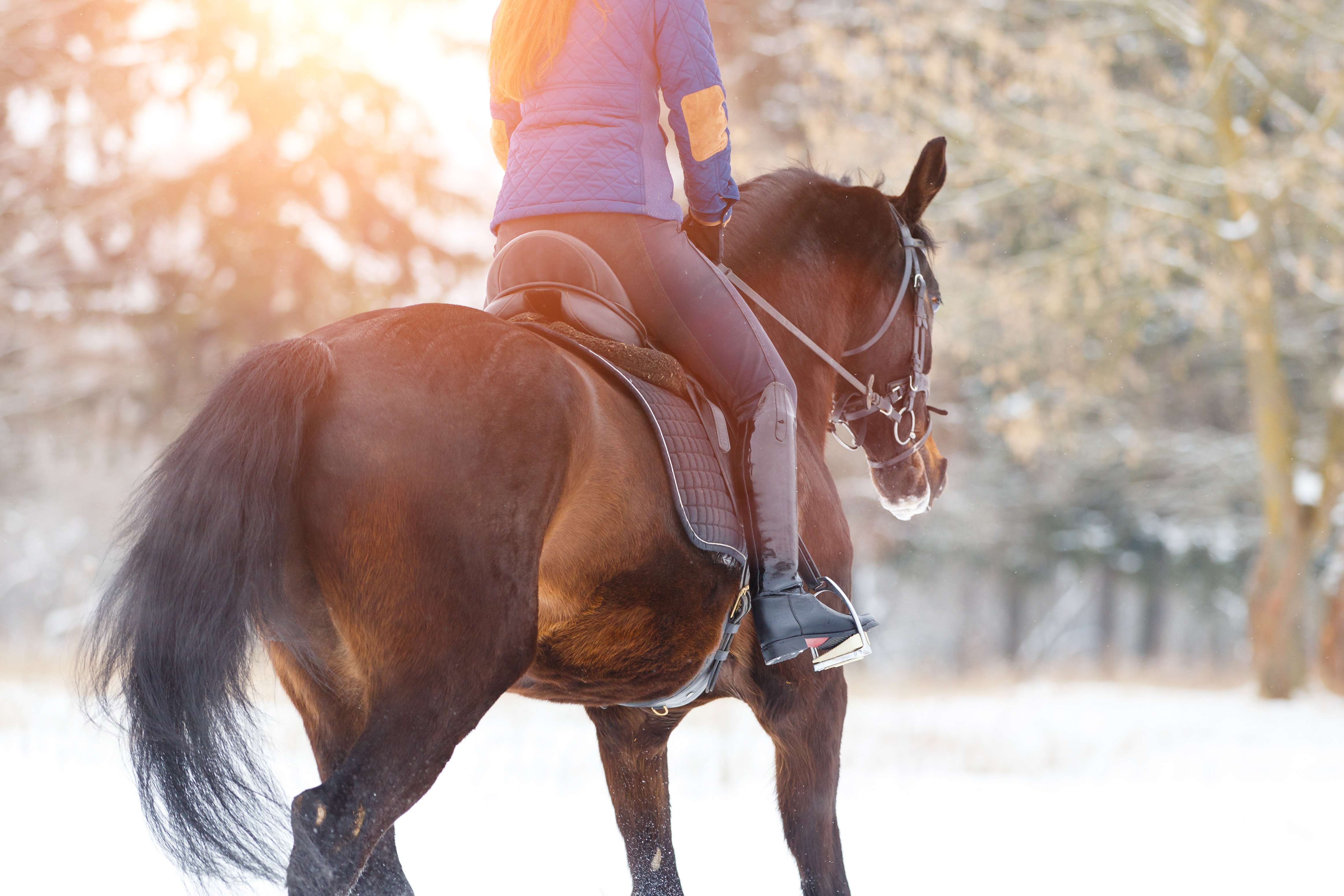Tips to Safely Exercise Horses in Winter
 While horses and humans alike
can appreciate a little break from the hot and humid days of summer, if
inadequately prepared for the colder temps ahead, winter can be a rude
awakening for both you and your horse.
While horses and humans alike
can appreciate a little break from the hot and humid days of summer, if
inadequately prepared for the colder temps ahead, winter can be a rude
awakening for both you and your horse.
In this post, we will touch on some of the challenges that wintertime exercise can pose to your horse's health and safety and include tips to combat each of these challenges.
Warm-ups and Cool-downs
As temps begin to drop, aim to extend or even double the length of your horse's warm-up and cool-down routine. If you've ever tried exercising or going for a run in the bitter cold without first warming up or stretching, you understand just how stiff and unpleasant your legs and body can feel. This also applies to your horse. Allowing your horse extra time to slowly increase their body temperature before diving into demanding exercise is a critical piece to your horse's health and performance abilities during the winter.
Pay close attention to how your horse reacts to exercising in the cold and only progress to your workout once your horse is seeming limber, focused, and energetic.
On top of this, it is important to allow your horse a proper cool-down period. Regardless of the season, when horses are hard at work, they produce heat and sweat. In the winter, excess sweat can build up and freeze, resulting in health complications. Therefore, give your horse adequate time to cool off at the end of each workout - they'll thank you for it.
Too Cold for Comfort
If the air is so cold that it hurts to breathe, shortening or forgoing workouts may be necessary when your horse's health and safety are at stake. Cold temps can be pretty hard on a performance horse as their lungs are required to take in large volumes of air during exercise. When the air is cold and dry, this can lead to some negative effects on your horse's lungs and airway.
According to a study by Davis et. al., at Oklahoma State University1, horses that cantered for five minutes in cold temperatures showed signs of airway changes that could eventually lead to chronic airway disease (if exercise continued for a prolonged period of time).
On top of this, cold weather can increase the frequency and severity of exercise induced pulmonary hemorrhaging (EIPH or lung bleeding). Since cold, dry air acts as an irritant on the lungs and airway passages, lung bleeding, wheezing, coughing, and shortness of breath can all occur.
When temps drop below freezing, make sure to adjust your workouts accordingly and scale back on the intensity if needed.
Footing Matters
Cold weather can quickly change the quality of the footing in the winter and with poor footing comes more chances for injury.
It is recommended to check the footing before each ride to make sure your training ground isn't frozen and rutted. If ice is present, it may be safer to sacrifice a workout or two until the conditions improve, as even a minor trip or fall can result in fractures or sprains.
If conditions don't improve rapidly, there are several ways that you can maintain the footing of your training ground so that you and your horse don't have to miss out on exercise. Some of these include regular surface grooming to ensure that the footing is evenly spread and that there is no build-up of water or ice, as well as adding magnesium chloride flakes to the footing in order to prevent freezing and allow you to get more wintertime use out of the space.
Keeping an Eye on Your Horse
Overall, carefully monitoring your horse's performance during the winter can give you a keen sense of how well they are coping with the weather and with training. Look for any signs of labored breathing, coughing, or wheezing as this may indicate the onset of chronic airway disease. If your horse continues to show these symptoms throughout the winter, it is advised to reduce or even omit exercise completely and consult with your veterinarian
Lack of energy, fatigue, and reluctance to move can also be an indication that your horse is experiencing trouble in the colder temperatures. If so, you may need to adjust your training routine in order to keep them comfortable and healthy. Do keep in mind that even long walks can be beneficial to your horse's fitness levels. Ultimately, it makes no sense to overdo it if you don't have to as your horse's safety and wellbeing should be valued over everything else.
1M. S. Davis, A. J. Lockard, D. J. Marlin, A. N. Freed. “Airway cooling and mucosal injury during cold weather exercise.” Equine Vet J Suppl. 2002 Sep; (34): 413–416. doi: 10.1111/j.2042-3306.2002.tb05458.x
